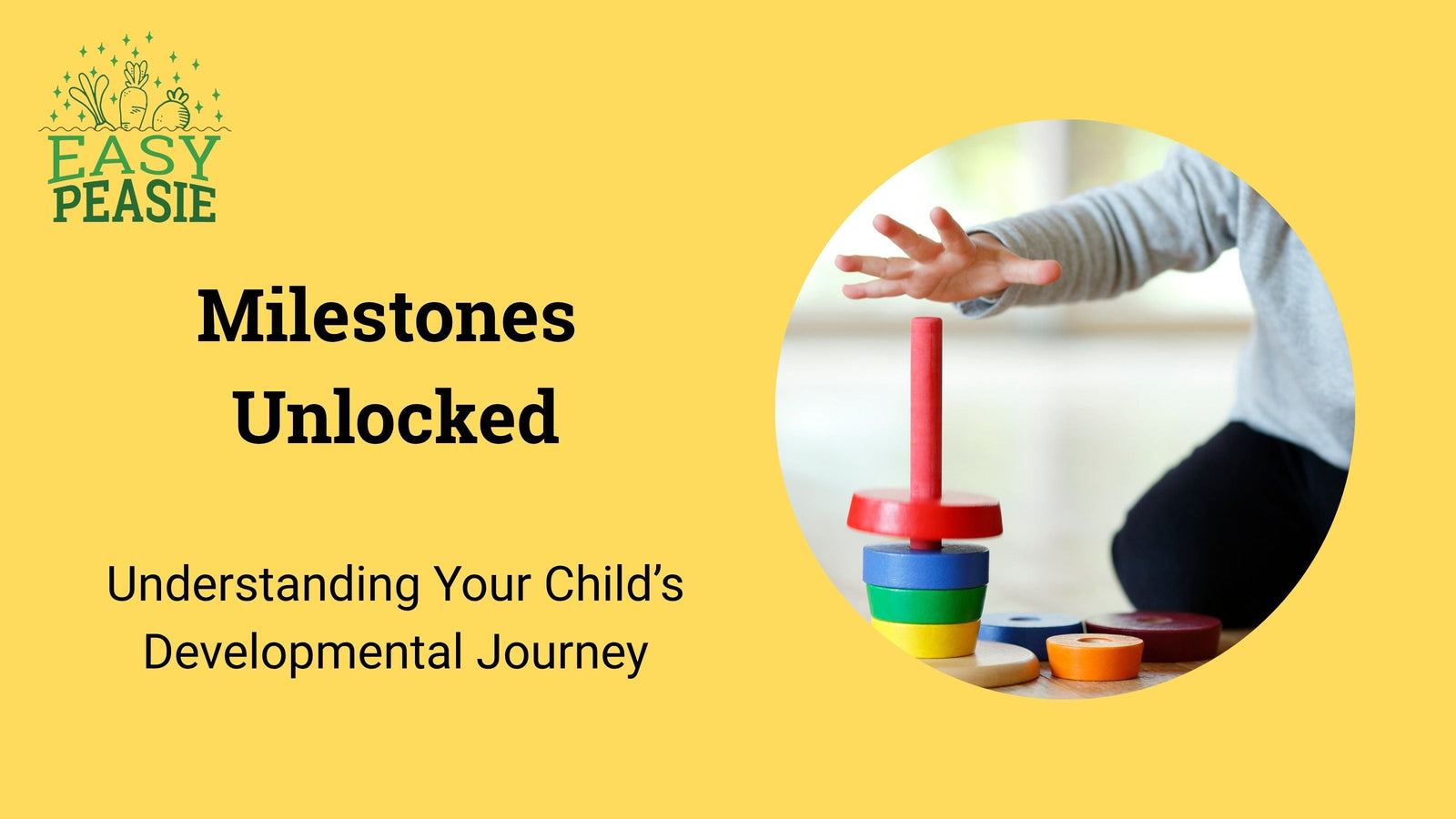Introduction: Unlocking the Secrets of Growth
Welcome to your guide through the fascinating journey of your child's development! Understanding developmental milestones is crucial for any parent who wants to actively support their child's growth and well-being. These milestones are not just checkboxes; they are windows into your child’s cognitive, physical, emotional, and social development.
Guided by reliable sources such as the American Academy of Pediatrics and the Centers for Disease Control and Prevention (CDC), this blog aims to provide you with a clear roadmap of what to expect at various stages of your child's growth. From their first steps to their first sentences, knowing these milestones helps you nurture their development effectively and ensure they're on the right track. Join us as we explore these critical markers in your child's life, offering expert tips and insights to help you foster their growth every step of the way.
Understanding Developmental Milestones
What Are Developmental Milestones?
Developmental milestones are behaviors or physical skills seen in infants and children as they grow and develop. Rolling over, crawling, walking, and talking are all considered milestones. They are the significant "firsts" that mark the stages of a child’s progress and help to paint a picture of their ongoing development.
The Role of Milestones in Monitoring Growth
Recognizing and tracking these milestones helps parents and healthcare providers determine whether a child is on track with their development or might need extra support. They serve as checkpoints, not only to celebrate new skills but also to potentially identify any developmental delays or concerns early on, ensuring timely intervention if necessary. By keeping informed about these milestones, you can better support your child's growth and developmental health.
Overview of Milestones by Age
Infancy (0-12 months)
During the first year, infants rapidly acquire new skills crucial for future development:
- By 3-6 months: Most babies begin to sit with support, respond to facial expressions, and may start to babble, mimicking sounds.
- By 6-9 months: Infants typically start sitting without support, respond to their names, and begin exploring through crawling.
- By 9-12 months: Many infants can pull themselves to stand, use simple gestures like waving, and may say their first intentional words.
Toddler (1-3 years)
Toddlers make significant strides in mobility and communication:
- By 12-18 months: Children often start walking independently, can follow simple one-step instructions, and frequently use single words.
- By 18-24 months: Most can run, start combining two words, show defiant behavior, and play simple pretend games.
- By 2-3 years: Skills include climbing well, speaking in multi-word sentences, and showing early social skills like taking turns.
Preschool (3-5 years)
Preschool years are marked by growing independence and cognitive skills:
- Early Preschool: Children can speak in longer sentences, begin counting, and start to understand concepts like time.
- By 4-5 years: They can follow multi-step instructions, recognize some letters and possibly write their names, and engage in more complex play that involves problem-solving and negotiation with peers.
School Age (5+ years)
As children enter school, their cognitive and social skills expand dramatically:
- Early School Age (5-7 years): Kids learn to read, write more consistently, and understand the rules of games, showing increased cooperation with peers.
- By 8-12 years: They can engage in complex conversations, perform more advanced reading and math, and develop a deeper understanding of their own emotions and those of others, enhancing their ability to form complex social relationships.
Special Focus: Major Developmental Questions
When Should Children Start Talking?
Most children begin to say their first meaningful words between 12 and 18 months. However, it’s important to recognize that each child develops at their own pace. Initial words are usually simple and may include names of familiar people, common objects, and essential needs. Encouraging your child through frequent speaking, reading, and interaction can help foster their language skills more effectively.
When Should My Child Start Reading?
Children typically start reading by the age of 6 or 7, which aligns with their entry into elementary school. Early literacy skills are built through exposure to books and being read to at home, starting from a very young age. Pre-reading skills like recognizing letters, understanding print is read from left to right, and storytelling can be nurtured in preschoolers to prepare them for reading.
When Is My Child Ready to Stay Home Alone?
The readiness of a child to stay home alone varies significantly among individuals and state laws. Generally, by the age of 12 to 14, children may start showing signs of sufficient maturity and responsibility. Key indicators include their ability to follow rules, manage a simple emergency, and remain calm and secure alone for short periods.
When Should My Child Start Walking?
Walking is a major milestone that typically occurs between 9 and 18 months. Most babies initially pull themselves up and may take a few tentative steps while holding onto furniture before walking independently. Encouraging safe exploration and providing plenty of practice time can support this developmental leap. Remember, children hit this milestone at different times, and late walkers often catch up with no problems.
Challenges and Variances in Development
Normal Variances in Milestone Achievement
Developmental milestones provide a general guideline, but it's essential to recognize that each child is unique. Most children will not hit every milestone precisely on time, and this variability is typically no cause for concern. For example, some children may start walking as early as 9 months, while others might not take their first steps until 15 months. Both scenarios can be perfectly normal.
Recognizing Developmental Delays
While variations are normal, certain signs might indicate more significant developmental delays. Parents should be alert for red flags such as a lack of social smiles by 6 months, not babbling by 12 months, or the absence of communicative gestures (pointing, waving bye-bye) by 12 months. If a child isn't walking by 18 months, or if they have lost skills they once had, it’s important to consult a healthcare provider to discuss these concerns. Early intervention can be crucial in addressing developmental delays effectively.
Role of Parents and Caregivers
Supporting Child Development through Activities
Parents play a pivotal role in fostering their child’s development by engaging in regular, meaningful activities. Simple routines like reading stories, playing interactive games, and exploring the outdoors together can significantly enhance a child's cognitive, language, and motor skills. Encouraging explorative play also boosts problem-solving abilities and creativity.
Creating a Supportive Environment
Creating a nurturing and enriching environment is critical for a child’s growth. This means providing a safe space where children can explore and learn, with access to a variety of educational toys and materials that are age-appropriate. Equally important is the emotional environment: showing warmth, affection, and consistent support encourages children to engage more deeply in learning and social interactions, laying the groundwork for healthy development.
Resources and Support
Recommended Developmental Classes and Resources
Exploring child development classes can be a game-changer for both children and parents. These classes offer structured activities that are designed to boost various aspects of development, from language skills to physical coordination. Additionally, many parenting websites and local libraries provide books, videos, and toolkits that guide and educate parents on fostering developmental skills at home.
Utilizing Professional Help and Guidance
When it comes to developmental concerns or seeking ways to enhance a child’s growth, professional guidance can be invaluable. Pediatricians, child psychologists, and specialized educators can offer tailored advice and strategies based on the latest research and methodologies. Parents should feel empowered to reach out for professional help to ensure they are supporting their child’s development optimally, including regular screenings and follow-up appointments as recommended by healthcare providers.
Summary: Navigating Developmental Milestones
Emphasizing Milestone Significance
Understanding and monitoring developmental milestones are crucial for assessing a child's growth and ensuring they are on track. Each milestone, from a baby’s first steps to a school-aged child's reading proficiency, marks an important point in a child’s cognitive, physical, and emotional development.
Active Parental Involvement
Parents play a pivotal role in their child's developmental journey. It is essential for parents to actively engage with their children through play, communication, and educational activities, and to keep informed about the typical developmental stages. Observing and celebrating each new achievement not only supports a child’s growth but also strengthens the parent-child bond. This engagement also enables parents to identify any potential developmental concerns early, ensuring timely intervention and support.
Leave your comments below; we love to hear from you! And follow Easy Peasie for more convo about kids, parenting, and veggies on Instagram (@EasyPeasieCo), Facebook (EasyPeasie), and YouTube (EasyPeasieCo)! ~ThePeas





